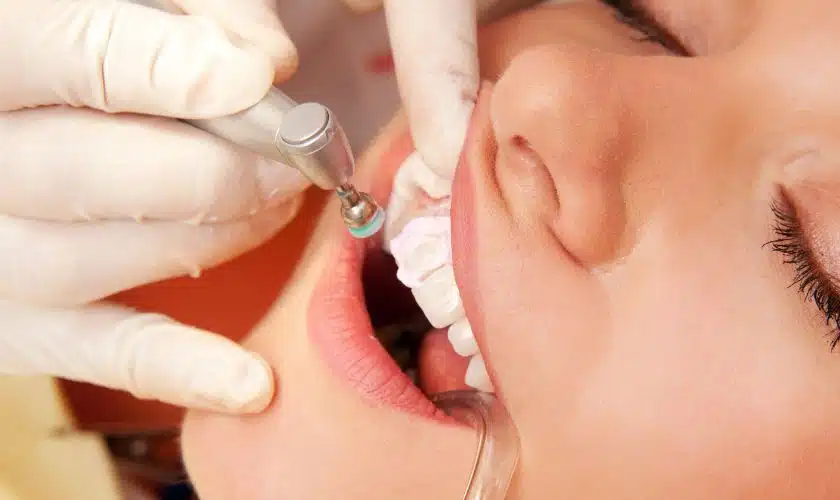
Welcome to our blog! Today, we’re going to discuss a topic that affects many people but is often overlooked – gum disease. Did you know that gum disease doesn’t just affect your dental health but also has links to your overall well-being? That’s right! Gum disease can contribute to the development of several chronic diseases such as heart disease and diabetes. In this article, we’ll explore the types of gum diseases and how they can be prevented, as well as the relationship between gum health and overall health. So keep reading to learn more about this important topic!
What Is Gum Disease and it’s Symptoms?
Gum disease, also known as periodontal disease, is a bacterial infection that affects the gums and supporting structures of your teeth. It’s caused by plaque buildup on your teeth, which can lead to inflammation and damage to the gums.
The mildest form of gum disease is gingivitis, which causes redness and swelling in the gums. You may notice bleeding when you brush or floss your teeth. If left untreated, gingivitis can progress into periodontitis – a more severe form of gum disease.
Periodontitis occurs when the bacteria in plaque spread below the gum line and cause pockets to develop between your teeth and gums. These pockets become infected with bacteria, leading to further inflammation and destruction of tissue.
Symptoms of periodontitis include bad breath, receding gums (making it look like your teeth are growing longer), loose or shifting teeth, changes in bite alignment or fit of dentures/appliances due to bone loss around affected areas.
The Types of Gum Disease and How to prevent them
Gum disease is a common oral health issue that can lead to tooth loss and other serious health problems. There are two main types of gum disease: gingivitis and periodontitis.
Gingivitis is the milder form of gum disease, characterized by redness, swelling, and bleeding gums. It’s caused by plaque buildup on the teeth, which irritates the gums. Fortunately, gingivitis can be reversed with proper oral hygiene practices such as brushing twice a day and flossing daily.
Periodontitis is a more severe form of gum disease that occurs when gingivitis goes untreated. The bacteria in plaque releases toxins that cause inflammation in the gums and damage to the bone supporting your teeth. This condition requires professional treatment from a dentist or periodontist.
Preventing gum disease involves maintaining good oral hygiene habits such as brushing at least twice per day for two minutes each time using fluoride toothpaste, flossing daily to remove food particles between teeth and using mouthwash regularly to kill any remaining bacteria.
Other ways you can prevent gum diseases include quitting smoking or tobacco use since it increases one’s risk for developing this type of infection; eating healthy foods rich in vitamins C & D which support strong bones & immune system function while inhibiting bacterial growth; reducing stress levels through mindfulness meditation techniques like Yoga or Tai Chi; scheduling regular dental check-ups once every six months even if you don’t experience any symptoms related specifically to your gums!
Relation between Gum Disease and Overall Health
Did you know that gum disease can affect more than just your oral health? Studies have shown that there is a strong link between gum disease and other health issues, including heart disease, stroke, diabetes, and even pregnancy complications.
When you have gum disease, the bacteria in your mouth can enter the bloodstream and travel to different parts of your body. This can lead to inflammation throughout the body which has been linked to a number of chronic diseases.
For example, studies suggest that people with gum disease are at higher risk for developing heart disease. The inflammation caused by gum disease may contribute to the buildup of plaque in arteries which increases the risk of cardiovascular problems.
Gum disease has also been linked to an increased risk for strokes. Bacteria from infected gums can cause blood clots or blockages which could result in a stroke.
In addition to these serious conditions, researchers have also found links between gum disease and diabetes as well as premature births. Pregnant women with untreated periodontal (gum) diseases may be at higher risk for delivering preterm or low birth weight babies because of changes in their bodies’ chemical signals triggered by oral infections.
With all this information highlighting the importance of good oral hygiene practices such as regular brushing and flossing it’s clear why taking care of our teeth is so important!
How to Treat Gum Disease
When it comes to treating gum disease, the approach will depend on the severity and type of gum disease that you have. In general, early-stage gum disease can be treated with good oral hygiene habits such as regular brushing and flossing, along with professional dental cleanings.
For more advanced stages of gum disease, your dentist may recommend scaling and root planing. This involves a deep cleaning below the gum line to remove plaque and tartar buildup. Your dentist may also prescribe antibiotics or antimicrobial mouthwash to help eliminate bacteria.
If there is significant damage or recession of the gums, surgery may be necessary to repair them. This could involve grafting tissue from other parts of your mouth onto areas where the gums have receded.
It’s important to note that even if you undergo treatment for gum disease, it’s crucial to maintain good oral hygiene habits at home and attend regular dental checkups in order to prevent future issues.
The best way to treat gum disease is by catching it early through routine dental visits and practicing good oral hygiene habits at home. When caught early on, most cases of gingivitis can be effectively treated without surgery or other invasive procedures.
Conclusion
Gum disease is a serious condition that can impact your overall health. It’s essential to practice good oral hygiene habits, such as brushing and flossing regularly and visiting your dentist for routine checkups.
If you notice any symptoms of gum disease, such as bleeding gums or bad breath, seek treatment right away. Early intervention can prevent the progression of gum disease and help protect your overall health.
Recent Posts

Braces or Invisalign: Which Option is Best for You? Exploring Orthodontic Treatments in Gainesville

Common Dental Concerns in Different Age Groups: How a Family Dentist Addresses Them All

How Adult Braces Can Improve Oral Health in Gainesville

Debunking Myths About Oral Cancer: Separating Fact from Fiction

Why Orthodontic Treatment is Essential for Dental Health
Categories
- Adult Braces (1)
- Cosmetic Dentistry (15)
- Dental Care (37)
- Dental Filling (1)
- Dental Health (14)
- Dental Hygiene (7)
- Dental Implant (3)
- Dentures (5)
- Emergency Dentistry (9)
- Family Dentistry (17)
- General Dentistry (21)
- Invisalign (2)
- Laser Teeth Whitening (1)
- Oral Cancer (1)
- Oral Health (25)
- Orthodontics (22)
- Pediatric Dentistry (10)
- Periodontal Treatment (4)
- Restorative Dentistry (5)
- Root Canal Trearment (1)
- Teeth Whitening (5)
- Uncategorized (1)
- Veneers & Lumineers (4)

